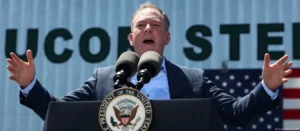The Trump administration has taken steps to eliminate emissions regulations, claiming that the EPA lacks the authority to enforce them. The agency’s head revealed the plan, along with more relaxed emissions standards, during a visit to a truck factory.
On Tuesday, US Environmental Protection Agency (EPA) Director Lee Zeldin claimed that his agency lacks the authority to regulate greenhouse gas emissions.
Zeldin criticized the EPA’s 2009 “endangerment finding”—a foundational scientific assessment that supports the federal government’s power to regulate emissions—calling its conclusions flawed and ideologically driven.
He argued that the Supreme Court’s 2024 ruling on “Chevron deference” reinforces the position that only Congress, not the EPA, has the authority to regulate emissions from vehicles and the energy sector.
“We cannot unilaterally decide as an agency to tackle global climate change simply by granting ourselves that authority,” Zeldin said.
He blamed strict environmental regulations for slowing the US economy and pledged to roll back emissions standards.
“If finalized, today’s announcement would represent the most significant deregulatory action in US history,” Zeldin said during a speech at the Kenworth Truck Factory in Indianapolis, Indiana.
Flanked by Energy Secretary Chris Wright, a former fracking executive, Zeldin also accused past Democratic administrations of using ideological motives to justify the dangers of greenhouse gas emissions.
In a press release, the EPA claimed that the Obama and Biden administrations used the 2009 endangerment finding to justify more than $1 trillion in regulations. The statement also asserted that repealing the finding would save $54 billion each year—though it offered no evidence to support either figure.
What’s next?
The endangerment finding, a peer-reviewed assessment grounded in scientific consensus, was developed in response to the Supreme Court’s 2007 Massachusetts v. EPA decision. That ruling confirmed the EPA’s authority under the Clean Air Act to regulate greenhouse gas emissions and required the agency to determine whether such emissions posed a threat to public health.
EPA Director Lee Zeldin argued that repealing the finding would eliminate electric vehicle mandates and, in his words, “drive a dagger into the heart of the climate change religion.”
The repeal is expected to spark legal challenges, and the administration is likely anticipating that the Supreme Court will overturn the 2007 precedent in its favor when the case ultimately reaches the high court.
Dan Becker, of the US-based environmental group Center for Biological Diversity, told AFP that it is highly unusual for a government to argue against environmental regulations rather than industry doing so. He expressed hope that the court would “recognize that this is science and not politics,” emphasizing that the 2007 decision was grounded in sound reasoning.
“There was a good reason for that precedent and no good reason to revoke it,” he said. “But… this is a very political court.”
The proposed repeal will now undergo a 45-day public comment period.
Since returning to office in January, President Donald Trump has again pulled the United States out of the Paris Agreement and resumed his push to greatly expand domestic fossil fuel production.